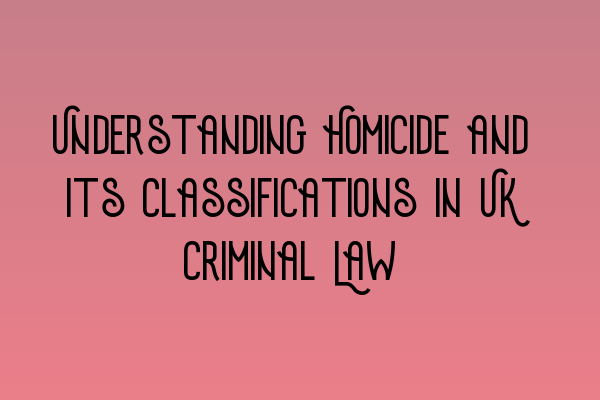Understanding Homicide and Its Classifications in UK Criminal Law
In the field of criminal law in the United Kingdom, homicide refers to the act of one person causing the death of another. It is a serious offense that is categorized into various classifications, each with its own distinct legal implications. As a solicitor specializing in criminal law at SQE Criminal Law & Practice Law UK, I aim to provide you with a comprehensive understanding of homicide and its classifications.
What is Homicide?
Homicide is a broad term that encompasses both lawful and unlawful acts resulting in the death of an individual. While some acts of homicide can be justified or authorized under certain circumstances, such as self-defense or the execution of a lawful sentence, others are regarded as criminal offenses.
Classification of Homicide
In UK criminal law, homicide can be classified into three main categories: murder, manslaughter, and infanticide. Let’s delve into each classification:
Murder
Murder is the most serious form of homicide. It occurs when a person unlawfully causes the death of another with the intention to kill or cause grievous bodily harm. The key element that distinguishes murder from other forms of homicide is the presence of the requisite intention.
When defending a murder charge, there may be specific defenses to consider, such as diminished responsibility or loss of control. It is crucial to consult with a qualified criminal defense solicitor to navigate the intricacies of murder cases.
Manslaughter
Manslaughter refers to the unintentional killing of another person or the intentional killing without the necessary intent to classify it as murder. Manslaughter can be further divided into two subcategories: voluntary and involuntary.
Voluntary manslaughter occurs when a person intentionally causes the death of another, but with mitigating circumstances, such as provocation or diminished responsibility. Involuntary manslaughter, on the other hand, involves unintentional killings resulting from reckless or negligent conduct.
Understanding the distinction between murder and manslaughter is essential in achieving the appropriate charge and avoiding unnecessary legal consequences. Seek legal advice to determine the best course of action in a manslaughter case.
Infanticide
Infanticide is a unique classification of homicide that applies specifically to the killing of a child under the age of one by their mother. It is considered a separate offense due to the recognition that certain physiological and psychological factors may lead to the offense.
Recognizing the complexities surrounding infanticide cases is crucial, as they require a sensitive approach and expert legal representation. Consult with a knowledgeable solicitor to understand the legal implications and defense strategies pertaining to this classification of homicide.
Understanding the classifications of homicide is paramount when navigating the legal system and ensuring that the appropriate charges are filed. If you require further assistance or legal representation, our team at SQE Criminal Law & Practice Law UK is well-equipped to provide expert advice and guidance.
For additional resources related to legal exams and preparation, we recommend checking out the following articles:
- SQE 1 Practice Exam Questions
- SQE 1 Practice Mocks FLK1 FLK2
- SQE 2 Preparation Courses
- SQE 1 Preparation Courses
- SRA SQE Exam Dates
By familiarizing yourself with these resources, you can enhance your legal knowledge and improve your chances of success in your legal examinations.
For all your criminal law needs and expert guidance, contact SQE Criminal Law & Practice Law UK today!
